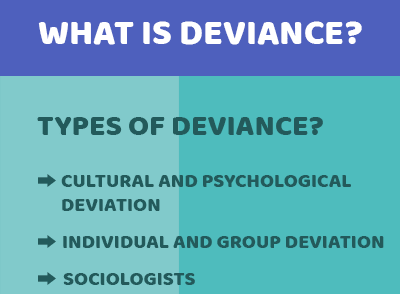What is Deviance?

Deviance is behaviour that violates the norms of a particular society. Deviance is the non-conformity to a given norm, or set of norms, that is accepted by most of society. Deviance, means non-conformity to social norms.
The term Deviance is preferred by sociologists over the concept of abnormal behavior because of the letters connotation of psychological illness rather than social maladjustment or conflict.
It is always defined from the point of view of a particular normative structure, and in a complex society where there are a multiplicity of groups and conflicting normative standards, each member of the society is at some time liable to be considered deviant by one standard or another.
Also read | The Dimensions of Role.
Main difficulties that arise in defining Deviance.
Certain difficulties arise in defining deviation. What is regarded deviant can shift from time to time and place to place? That is, deviance in one time period can become non-deviance in another.
Thus, there is variation by trace. Due to cultural differences, deviation of one group may not be so in another. In some societies polygamy is the prescribed rule of marriage which in others is viewed as social deviance as they practice monogamy.
Hence there is variation by culture. Social status is significant in considering an act as deviance e.g. men have greater social permissiveness for smoking, drinking publicly, than women in India. Thus there occurs variation by social position.
Also read | Types of Roles.
Types of Deviance.
Perhaps the least satisfactory definition of abnormality from a psychological point of view is in terms of a deviation from social norms though this has not prevented repressive regimes from using such criteria to stifle political dissent.
For example in Stalinist Russia, psychiatrists were often called upon to hospitalize dissidents on the basis of them suffering a mental disorder.
The difficulties of establishing what is normal and abnormal are well illustrated by changing perspectives on homosexuality. This has been seen as abnormal behaviour, sometimes even as an illness.
Also read | The Concept of Role.
Cultural and Psychological Deviation: Departure from the deviant norms of culture results in culture deviation. When the personality exhibits abnormality and deviates from the norms it is psychological deviation e.g. neurotic psychotic.
Individual and Group Deviation: When a person deviates from the sub-cultural norm it is termed as individual deviation e.g. a upper class educated boy becoming a criminal.
When the sub-culture norms are deviant or condemned by the general values and norms of the society, it is termed as group deviation e.g. street corner gang of unemployed youth doing illegal activities.
Also read | The Linguistic Classification by the tribes in India.
Sociologists: Call engaging in deviant acts primary deviance. Behaviors appropriate to someone who has already been labelled as deviant are called secondary deviance.


